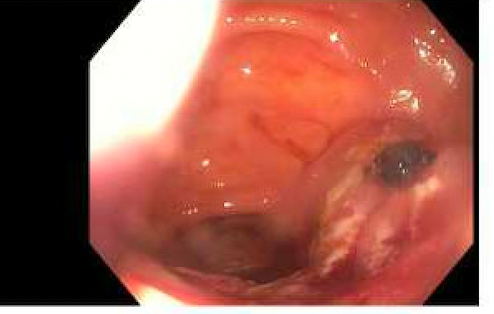Sunday Poster Session
Category: Colon
P0444 - An Unusual Culprit Behind Melena: Medullary Carcinoma of the Colon
Sunday, October 26, 2025
3:30 PM - 7:00 PM PDT
Location: Exhibit Hall

Lauren Davis, DO
Lankenau Medical Center
Wynnewood, PA
Presenting Author(s)
Lauren Davis, DO1, Erin Hollis, DO1, Mark McGarrey, MD1, Julianna Tantum, DO1, William Haberstroh, DO2
1Lankenau Medical Center, Wynnewood, PA; 2Bryn Mawr Medical Specialists, Bryn Mawr, PA
Introduction: Medullary carcinoma of the colon is a rare subtype of colorectal carcinoma characterized by poor glandular differentiation. It is often associated with mismatch repair deficiency and high microsatellite instability. This subtype of colon cancer is most commonly seen in women and has a better prognosis compared to other poorly differentiated adenocarcinomas. We present a patient with weight loss who was found to have iron deficiency anemia. Colonoscopy revealed a large mass that was found to be invasive medullary carcinoma of the colon.
Case Description/
Methods: An 89-year-old female with a history of hypertension, hypothyroidism, and limited scleroderma presented with worsening shortness of breath with exertion. She also reported decreased oral intake with 30-pound weight loss in the last year. On admission, she was found to have evidence of right distal pulmonary embolism for which she was started on apixaban. After starting anticoagulation, she had evidence of melena with a hemoglobin decrease from 12 g/dL to 10 mg/dL. Further inpatient evaluation included upper endoscopy and colonoscopy. Upper Endoscopy was notable for patent Schatzki ring but otherwise unremarkable. Colonoscopy revealed a fungating non-obstructing large mass with active oozing at the splenic flexure (Figure 1). Pathology showed poorly differentiated carcinoma. She was discharged with close interval colorectal surgery follow-up. She ultimately underwent laparoscopic transverse colectomy and pathology showed invasive adenocarcinoma with extensive necrosis and features consistent with medullary carcinoma.
Discussion: Medullary colon cancer is an exceedingly rare but well-defined histological subtype of colorectal carcinoma with a reported incidence of 0.03% of all colorectal cancers. Histologically, medullary carcinoma of the colon exhibits poor glandular differentiation, a solid growth pattern, and a prominent intraepithelial lymphocytic infiltrate. Predominantly affecting elderly females and typically located in the right colon, these tumors may present atypically, as in this case with melena. Despite their histologic features suggestive of aggressive behavior, medullary colon cancers paradoxically carry a more favorable prognosis than other poorly differentiated colorectal carcinomas. Early recognition of such rare presentations is essential for timely diagnosis and appropriate management.

Figure: Figure 1. Mass found at the splenic flexure during colonoscopy status post tattoo, found to be medullary carcinoma after surgical resection
Disclosures:
Lauren Davis indicated no relevant financial relationships.
Erin Hollis indicated no relevant financial relationships.
Mark McGarrey indicated no relevant financial relationships.
Julianna Tantum indicated no relevant financial relationships.
William Haberstroh indicated no relevant financial relationships.
Lauren Davis, DO1, Erin Hollis, DO1, Mark McGarrey, MD1, Julianna Tantum, DO1, William Haberstroh, DO2. P0444 - An Unusual Culprit Behind Melena: Medullary Carcinoma of the Colon, ACG 2025 Annual Scientific Meeting Abstracts. Phoenix, AZ: American College of Gastroenterology.
1Lankenau Medical Center, Wynnewood, PA; 2Bryn Mawr Medical Specialists, Bryn Mawr, PA
Introduction: Medullary carcinoma of the colon is a rare subtype of colorectal carcinoma characterized by poor glandular differentiation. It is often associated with mismatch repair deficiency and high microsatellite instability. This subtype of colon cancer is most commonly seen in women and has a better prognosis compared to other poorly differentiated adenocarcinomas. We present a patient with weight loss who was found to have iron deficiency anemia. Colonoscopy revealed a large mass that was found to be invasive medullary carcinoma of the colon.
Case Description/
Methods: An 89-year-old female with a history of hypertension, hypothyroidism, and limited scleroderma presented with worsening shortness of breath with exertion. She also reported decreased oral intake with 30-pound weight loss in the last year. On admission, she was found to have evidence of right distal pulmonary embolism for which she was started on apixaban. After starting anticoagulation, she had evidence of melena with a hemoglobin decrease from 12 g/dL to 10 mg/dL. Further inpatient evaluation included upper endoscopy and colonoscopy. Upper Endoscopy was notable for patent Schatzki ring but otherwise unremarkable. Colonoscopy revealed a fungating non-obstructing large mass with active oozing at the splenic flexure (Figure 1). Pathology showed poorly differentiated carcinoma. She was discharged with close interval colorectal surgery follow-up. She ultimately underwent laparoscopic transverse colectomy and pathology showed invasive adenocarcinoma with extensive necrosis and features consistent with medullary carcinoma.
Discussion: Medullary colon cancer is an exceedingly rare but well-defined histological subtype of colorectal carcinoma with a reported incidence of 0.03% of all colorectal cancers. Histologically, medullary carcinoma of the colon exhibits poor glandular differentiation, a solid growth pattern, and a prominent intraepithelial lymphocytic infiltrate. Predominantly affecting elderly females and typically located in the right colon, these tumors may present atypically, as in this case with melena. Despite their histologic features suggestive of aggressive behavior, medullary colon cancers paradoxically carry a more favorable prognosis than other poorly differentiated colorectal carcinomas. Early recognition of such rare presentations is essential for timely diagnosis and appropriate management.

Figure: Figure 1. Mass found at the splenic flexure during colonoscopy status post tattoo, found to be medullary carcinoma after surgical resection
Disclosures:
Lauren Davis indicated no relevant financial relationships.
Erin Hollis indicated no relevant financial relationships.
Mark McGarrey indicated no relevant financial relationships.
Julianna Tantum indicated no relevant financial relationships.
William Haberstroh indicated no relevant financial relationships.
Lauren Davis, DO1, Erin Hollis, DO1, Mark McGarrey, MD1, Julianna Tantum, DO1, William Haberstroh, DO2. P0444 - An Unusual Culprit Behind Melena: Medullary Carcinoma of the Colon, ACG 2025 Annual Scientific Meeting Abstracts. Phoenix, AZ: American College of Gastroenterology.
